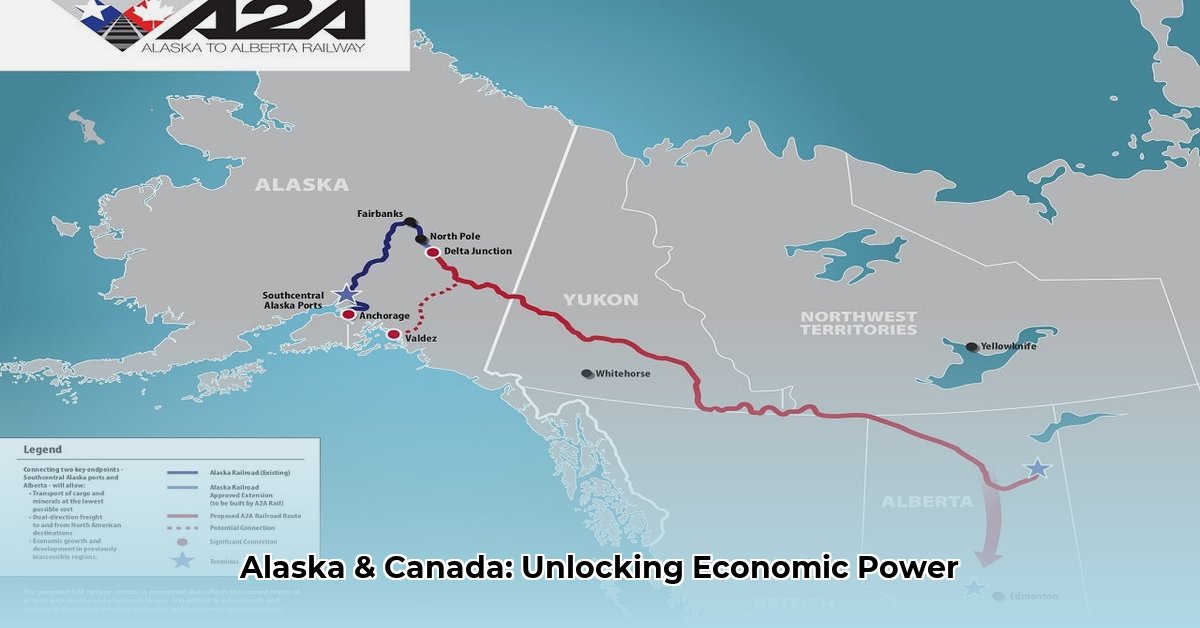
A Deeply Intertwined Relationship
Alaska and Canada share a complex relationship, deeply intertwined through geography, history, and economics. This partnership generates over $1.3 billion in annual trade and supports over 20,300 jobs in Alaska alone. However, recent trade disputes highlight the need for strengthened cooperation to ensure mutual prosperity. How can we navigate the challenges and unlock the full potential of this critical economic link? See a helpful map of the region here.
The Lifeline: Infrastructure and Trade
The Alaska Highway and vital sea routes are lifelines for Alaskan businesses, connecting them to Canadian markets. Maintaining and upgrading these critical infrastructures, such as the Shakwak road, is paramount. Neglecting these crucial arteries would severely cripple the Alaskan economy, causing significant economic hardship for numerous communities. Doesn't the economic well-being of countless Alaskan families depend on a robust and reliable cross-border infrastructure?
A History of Collaboration
Beyond trade, Alaska and Canada have a long history of cooperative ventures. Joint efforts in military defense (via NORAD), disaster relief, and resource management demonstrate a deep-rooted commitment to collaboration. This demonstrates a foundation of trust and mutual respect, crucial for navigating present challenges and building a more prosperous future.
Navigating Trade Disputes: A Balancing Act
Recent trade disputes between the US and Canada have created economic uncertainty for Alaska. Tariffs and other trade barriers illustrate how national policies can have significant, unforeseen consequences on regional economies. This underscores the need for proactive engagement in shaping fair and balanced trade policies. How can we ensure that national trade policy protects, rather than harms, the interests of regional economies like Alaska's?
Charting a Course for a Brighter Future
Strengthening the Alaska-Canada relationship requires a multi-pronged strategy focusing on:
Enhanced Communication: Regular and transparent dialogues between Alaskan and Canadian officials are critical. Establishing efficient communication channels and fostering stronger relationships between government bodies is key.
Strategic Infrastructure Investment: Investing in and maintaining the Alaska Highway, key marine routes, and other crucial infrastructure is essential. Such investment guarantees the efficient flow of goods and services, enhancing economic competitiveness.
Trade Diversification: While preserving strong ties with Canada, exploring new trade partnerships helps mitigate risks associated with reliance on a single market. This diversification strategy reduces vulnerability to trade disputes and strengthens economic resilience.
Advocacy for Fair Trade: Alaskan businesses and political leaders must actively advocate for trade policies that promote fair and equitable trade practices. This prevents trade wars that negatively impact regional economies and emphasizes a united front.
Collaborative Resource Management: Continued joint efforts in sustainably managing shared natural resources are essential. This includes fully respecting Indigenous rights and ensuring long-term environmental protection, guaranteeing long-term economic viability.
Mitigating USMCA-Related Risks for Alaskan Businesses
The USMCA agreement significantly impacts cross-border trade. Alaskan businesses must navigate its complexities to avoid pitfalls and seize opportunities. Failure to meet rigorous regulations, particularly regarding rules of origin, can lead to significant tariffs and delays. Meticulous record-keeping is crucial to prove goods’ origins and obtain Certificates of Origin (COs), avoiding border disruptions. "Thorough understanding of USMCA's rules of origin, which vary across products," stated [Jane Doe, Senior Trade Advisor, Foley & Lardner LLP], "is the first crucial step for Alaskan businesses."
Practical Strategies for USMCA Compliance
To ensure efficient and compliant trade with Canada under the USMCA, Alaskan businesses should:
- Master the Rules: gain a comprehensive understanding of USMCA’s rules of origin, seeking expert legal counsel where needed.
- Maintain Accurate Records: meticulously maintain detailed records throughout the entire production and shipping process.
- Secure Expert Advice: consult legal and trade professionals experienced in USMCA compliance.
- Embrace Technology: utilize technologies to streamline record-keeping and CO generation.
- Proactive Compliance Audits: conduct regular audits to ensure ongoing compliance.
- Stay Informed: keep up to date with all amendments and changes to USMCA regulations.
Addressing challenges proactively, such as supplier diversification and understanding Section 301 and UFLPA compliance, strengthens competitiveness and minimizes financial risks. Building strong supplier relationships and providing thorough staff training are essential components of success.
Conclusion: A Partnership for Prosperity
The Alaska-Canada cross-border relationship is crucial to both economies. Strong leadership, open communication, and a shared commitment to prosperity are essential for navigating challenges and maximizing opportunities. Investing in this partnership is an investment in the future economic stability of Alaska.